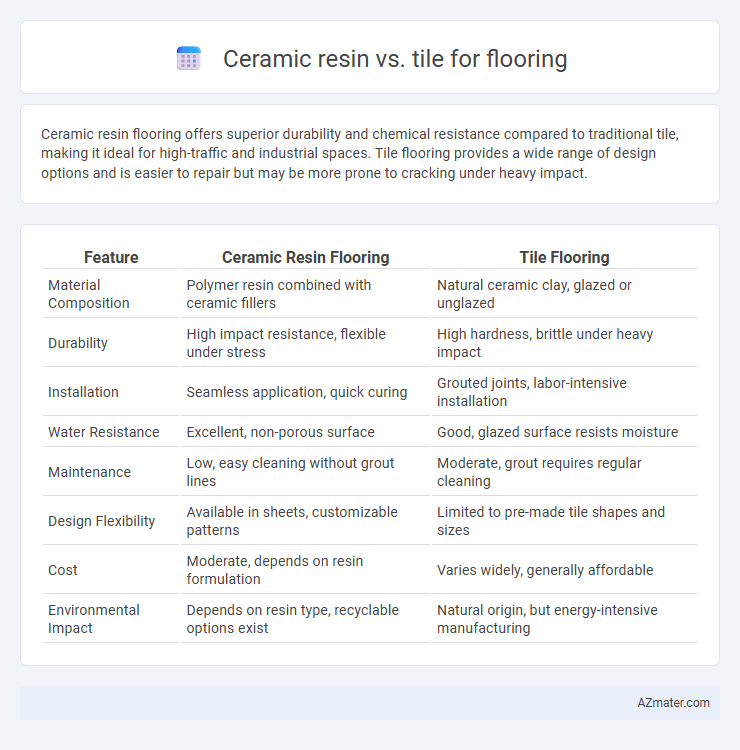Ceramic resin flooring offers superior durability and chemical resistance compared to traditional tile, making it ideal for high-traffic and industrial spaces. Tile flooring provides a wide range of design options and is easier to repair but may be more prone to cracking under heavy impact.
Table of Comparison
| Feature | Ceramic Resin Flooring | Tile Flooring |
|---|---|---|
| Material Composition | Polymer resin combined with ceramic fillers | Natural ceramic clay, glazed or unglazed |
| Durability | High impact resistance, flexible under stress | High hardness, brittle under heavy impact |
| Installation | Seamless application, quick curing | Grouted joints, labor-intensive installation |
| Water Resistance | Excellent, non-porous surface | Good, glazed surface resists moisture |
| Maintenance | Low, easy cleaning without grout lines | Moderate, grout requires regular cleaning |
| Design Flexibility | Available in sheets, customizable patterns | Limited to pre-made tile shapes and sizes |
| Cost | Moderate, depends on resin formulation | Varies widely, generally affordable |
| Environmental Impact | Depends on resin type, recyclable options exist | Natural origin, but energy-intensive manufacturing |
Understanding Ceramic Resin Flooring
Ceramic resin flooring combines the durability of ceramic with the flexibility and seamless finish of resin, offering enhanced resistance to impact, chemicals, and moisture compared to traditional tile floors. Unlike individual tiles requiring grout lines, ceramic resin creates a continuous surface, reducing maintenance and minimizing dirt accumulation. This flooring type is ideal for high-traffic or industrial spaces where both aesthetic appeal and robust performance are essential.
Overview of Tile Flooring Options
Tile flooring options include ceramic, porcelain, and natural stone varieties, each offering distinct durability and aesthetic qualities. Ceramic resin tiles provide enhanced flexibility and resistance to cracks compared to traditional ceramic tiles, making them suitable for high-traffic areas. Porcelain tiles are denser and more water-resistant, ideal for moisture-prone environments, while natural stone adds unique textures and patterns but may require regular maintenance.
Aesthetic Differences: Ceramic Resin vs Tile
Ceramic resin flooring offers a seamless, glossy finish with customizable patterns and colors, creating a modern, sleek aesthetic that mimics natural stone or concrete. Traditional tile flooring provides textured surfaces and varied designs, from intricate mosaics to classic porcelain looks, adding depth and character to spaces. The choice between ceramic resin and tile hinges on the desired visual impact, with resin emphasizing uniformity and fluidity, while tile highlights distinct grout lines and artisanal craftsmanship.
Durability and Longevity Comparison
Ceramic resin flooring offers superior durability with resistance to scratches, stains, and heavy foot traffic, making it ideal for high-use areas. Tile flooring, particularly porcelain and natural stone varieties, is also highly durable but can be prone to cracking under heavy impact. When comparing longevity, ceramic resin floors often last over 20 years with minimal maintenance, whereas tile floors, if properly installed and maintained, can exceed 30 years but may require grout sealing and occasional repairs.
Installation Process: Ceramic Resin vs Tile
Ceramic resin flooring offers a seamless installation process with a liquid application that cures to form a durable surface, often requiring less labor and time compared to traditional tile. Tile flooring installation demands precise placement, grout application, and curing time, which can extend project duration and complexity. Ceramic resin's ability to adapt to various subfloors and minimal preparation needs often results in faster, more cost-effective installation compared to the rigid and skill-intensive tile setting process.
Maintenance and Cleaning Requirements
Ceramic resin flooring offers superior resistance to stains and requires minimal maintenance compared to traditional tile, making it easier to clean with simple sweeping and mopping. Tile flooring, especially grout lines, demands more frequent scrubbing and sealing to prevent dirt buildup and discoloration, increasing overall upkeep time. Both options benefit from non-abrasive cleaners, but ceramic resin's seamless surface significantly reduces maintenance efforts and enhances durability.
Cost Analysis: Upfront and Long-Term
Ceramic resin flooring typically offers a lower upfront cost compared to traditional tile, making it appealing for budget-conscious projects. Over time, ceramic resin's durability and resistance to cracking can reduce maintenance and replacement expenses, whereas tile may incur higher long-term costs due to grout upkeep and potential breakage. Evaluating total cost of ownership reveals ceramic resin as a cost-effective option with minimal lifecycle expenses relative to tile flooring.
Slip Resistance and Safety Factors
Ceramic resin flooring offers superior slip resistance due to its textured surface and ability to incorporate anti-slip additives, making it ideal for high-traffic or wet areas. Tile floors, while durable, often require additional treatments or mats to enhance safety on slippery surfaces, especially when glazed. The choice between ceramic resin and tile significantly impacts workplace and home safety, with ceramic resin providing a more consistent slip-resistant performance.
Eco-Friendliness and Sustainability
Ceramic resin flooring offers enhanced eco-friendliness due to its lower energy consumption during manufacturing and long-lasting durability, reducing the need for frequent replacement. Tile floors, typically made from natural clay and minerals, provide sustainability through recyclability and minimal chemical treatments. Both options support green building practices, but ceramic resin's synthetic composition may involve more complex end-of-life disposal compared to the biodegradable nature of traditional ceramic tiles.
Best Applications for Each Flooring Type
Ceramic resin flooring is ideal for commercial and industrial spaces due to its high durability, chemical resistance, and seamless finish that prevents dirt accumulation. Tile flooring is best suited for residential areas like kitchens and bathrooms, offering easier installation, diverse design options, and moisture resistance. Choosing between ceramic resin and tile depends on specific needs such as foot traffic intensity, environmental exposure, and aesthetic preferences.

Infographic: Ceramic resin vs Tile for Flooring
 azmater.com
azmater.com